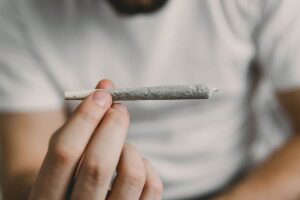
Marijuana dispensaries have seemed to pop up on street corners almost as quickly as bars or Starbucks shops. If we look at Colorado, specifically, the state has one of the highest rates of per capita dispensaries with over 570 retail stores and more than 430 licensed medical marijuana stores.
Truth be told, this boom in marijuana business has its reasons. Recreationally, the drug can help people relax and enjoy themselves more. The drug has also been found to aid chronic pain management, nerve pain from multiple sclerosis and can even lessen tremors caused by Parkinson’s disease.
Similar to alcohol, though, legalization doesn’t mean marijuana is without its risks. In particular, the drug can trigger dependence and addiction in some people who use it.
Can You Become Addicted to Marijuana?
In short, the answer to whether or not marijuana is addictive is yes. While marijuana has been touted as a safe drug to use compared to alcohol or opioids, recent data shared by the National Institute on Drug Abuse suggests otherwise.
Recent research has reported that at least 30 percent of people using marijuana struggle with addiction. Furthermore, if you started using marijuana before the age of 18, you’re up to seven times more likely to struggle with a marijuana use disorder.
These results don’t suggest that everyone who smokes marijuana will become addicted. In fact, it’s possible to experience minor withdrawal symptoms of marijuana use without actually suffering from a full-fledged addiction. However, like any drug, marijuana can be addictive.
Why Can Marijuana Be Addictive?
Ever wonder what causes the euphoric high you feel when you smoke marijuana? That’s caused by the active ingredient in the drug known as THC, or delta-9-tetrahydrocannabinol. When you smoke marijuana, THC enters your lungs and absorbs into your bloodstream.
From there, THC impacts the endocannabinoid (EC) system, a part of the brain responsible for how you feel, move and behave. THC attaches itself to cannabinoid receptors in the EC system, which leads to the high you feel, along with other effects like slowed reaction time and impaired judgment.
Constant and heavy use of marijuana can change the way your body produces and reacts to its own endocannabinoid neurotransmitters, leading to dependence and possible addiction.
While marijuana’s effects on the brain don’t discriminate from one individual to another, some people are more at risk of developing a marijuana use disorder than others. One reason for this is genetics. A 2019 study found that lower than normal levels of the CHRNA2 gene found in the cerebellum can indicate a higher risk of marijuana use disorder.
Mental health can also play a role in marijuana addiction. The drug’s euphoric and relaxing effects can ease depression and anxiety symptoms temporarily, but ongoing use can lead to a dual diagnosis disorder.
Diagnostic Criteria for Marijuana Use Disorder
If you feel that you’re struggling with a marijuana use disorder, the Diagnostic and Statistical Manual of Mental Disorders Fifth Edition (DSM-5) offers specific criteria to determine whether you’re struggling with an addiction or not.
If you have struggled with at least two of the following signs in the last 12 months, you may have a marijuana addiction that requires rehab from a credible treatment center like The Raleigh House:
1. You have taken marijuana in larger amounts over a longer period than was intended
2. You have not made an effort to cut down or control your marijuana use
3. You spend a significant amount of time trying to obtain marijuana, use it or recover from its effects
4. You have consistent and strong cravings for marijuana
5. Your recurring marijuana use has impacted your ability to complete work, school or personal obligations
6. You have continued to use marijuana despite having persistent or recurrent social or interpersonal problems caused or exacerbated by the effects of the drug
7. You have given up important recreational or occupational activities because of your marijuana use
8. You have continued to use marijuana, even in physically hazardous situations
9. You continue to use marijuana despite knowing of having persistent or recurrent physical or psychological problems not caused by the drug
10. You have built up a tolerance to marijuana, either by needing increased doses to feel its effects or experiencing withdrawal symptoms
Seek Addiction Treatment at The Raleigh House
At The Raleigh House, we have over 10 years of experience helping people just like you overcome their addiction and develop new ways to cope and live without substance abuse. Through our east to west approach that combines both evidence-based and experiential therapy treatments, we can help you get to the bottom of your marijuana use disorder and work through any behavioral health issues you may be struggling with.
Contact our expert team today to learn more about our treatment approach at The Raleigh House and to find out how to get started.



